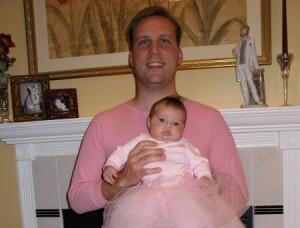I Love My Job – Medical Educator Edition

As a first year I began working alongside a Pediatrician who would become pivotal in shaping my view of doctors and specialty choice. The way she loved her job shined through every single day (and still does as I work with her in third year) and the example she was to me became key in my discovery of the importance pursuing a career in a field you love holds. She showed me how important it was to choose a specialty you are truly passionate about…partly because it benefits you, but mostly because it benefits your patients.
As I mentioned a few days ago, residency applications are looming on the horizon and, with that, comes the promise of graduation (uhh…I hope, anyway) and “the real world.” As I struggle to decide what I want to be when I grow up I find that speaking with people who truly love their job is not only incredibly eye-opening, but exceedingly inspiring to me. Last semester I began asking around to find some healthcare professionals who love what they do and are willing to tell y’all about it. I hope to build a resource here so medical students struggling with post-graduation planning can get a look into the day-to-day life of various areas of medicine and, hopefully, find a piece of themselves in one of these inspiring stories.
I started by asking Dr. Michael McKenna, pediatrician and pediatric program director at Indiana University, what he loves about his job as a medical educator and how he ended up in the position.
Here’s what he had to say…
![]()
J. Lo in The Wedding Planner, when asked why she is a wedding planner:
“Y’know, ‘Those who can’t do, teach?’ Well, those who can’t wed, plan!”
 While the above quote is a common phrase, I wholeheartedly disagree. People who teach don’t do so because they can’t hack it otherwise. They do it because their passion for their field is so great they can’t help but spread their knowledge, experience and passion to others.
While the above quote is a common phrase, I wholeheartedly disagree. People who teach don’t do so because they can’t hack it otherwise. They do it because their passion for their field is so great they can’t help but spread their knowledge, experience and passion to others.
I am a pediatrician, but the reason that I have been asked to write for Mind on Medicine’s “I Love My Job” series is because I teach newly minted doctors how to be pediatricians.
I am a Medical Educator.
I initially thought I was going to be a Pediatric Endocrinologist because it was the only organ system that made sense to me.

But before I had a chance to go on to fellowship, I had to pay my time to the State of Indiana.
No, I wasn’t making license plates in a minimum-security correctional facility. In medical school, I participated in a tuition payment program to serve in a medically underserved area. After residency participants needed to payback their time before doing any kind of fellowship. So, Endocrinology would have to wait.
Luckily, this did not preclude me from receiving the greatest honor of my career, serving as a Chief Resident of my residency program. Most residencies have one or more Chief Residents leading during their last year. In our program, Chiefs are expected to create the schedule and call schedules for the year. They also do a great deal of problem solving. Most importantly, Chief Residents teach residents and medical students. It was this aspect of my Chief year that changed the direction of my career.
Ever since I was a kid, I considered being a teacher, but being young and foolish, I didn’t consider it “cool enough”. These thoughts came flooding back during my time as Chief, as I realized medicine and teaching could be combined into one career. Ever since, I’ve had one all-encompassing (albeit cheesy-sounding) goal… helping residents become the best pediatricians they can be.
You don’t have to be Chief or take special classes to become a medical educator. The main quality needed is passion. I encourage everyone to incorporate medical education into every career path.
The best medical educators I know, just like the best doctors, are always adding to their knowledge base. For educators, this means attending workshops about giving feedback or creating curricula. You can even get a Master’s Degree in Medical Education.
 The day-to-day flow of a medical educator varies depending on specialty and interests. The main question of career medical educators is, “Who is paying for your time?”
The day-to-day flow of a medical educator varies depending on specialty and interests. The main question of career medical educators is, “Who is paying for your time?”
In medicine, you pay for your time by seeing patients in order to bill and generate revenue. Teaching doesn’t generate any revenue. Instead, I have to convince the Chairman that I am worthy of receiving money from the budget to teach.
Medical education is a great way to keep your career exciting. Each day is different. I might be mentoring a resident, seeing patients, developing a new workshop or a myriad other tasks on my “to-do” list. More importantly, being around learners all of the time constantly exposes me to their thirst for knowledge, keeping me excited about medicine.
Many students and residents are paralyzed by the perceived gravity of choosing a career, believing that once they choose their path, they are committed to it FOREVER. That is not true. Your MD (or DO or MBBS) opens many doors. If you ever get stuck in a rut, you can always find a new adventure without up-ending your life with a new residency. Bring a learner into your practice, teach at a nearby medical center, be a mentor. Be a medical educator!
Because of the way my clinical time is set up, no one is ever going to say that Dr. McKenna is my doctor. I am sure this sounds like a sad statement. Isn’t that why most people go into medicine in the first place? Yes, on occasion I long for that, but I have something much better. If I do my job right, I will have hundreds of pediatricians that will proudly (at least I hope!) say, “Dr. McKenna taught me how to be a pediatrician.”
That is why I am a Medical Educator.
![]()
 Michael McKenna is Associate Program Director of the Pediatrics Residency at Indiana University. He conducts scholarly work in the areas of social media and medicine as well as mentoring of chief residents. More importantly, he blogs about pop culture, academic medicine and history (occasionally all 3 together!) at Mamihlapinatapei (ironsalsa.wordpress.com). You can also follow him on Twitter @IronSalsa or email him at mpmckenn@ iupui.edu.
Michael McKenna is Associate Program Director of the Pediatrics Residency at Indiana University. He conducts scholarly work in the areas of social media and medicine as well as mentoring of chief residents. More importantly, he blogs about pop culture, academic medicine and history (occasionally all 3 together!) at Mamihlapinatapei (ironsalsa.wordpress.com). You can also follow him on Twitter @IronSalsa or email him at mpmckenn@ iupui.edu.
Image 1: sakhorn38 | FreeDigitalPhotos.net
Image 2: scottchan | FreeDigitalPhotos.net
